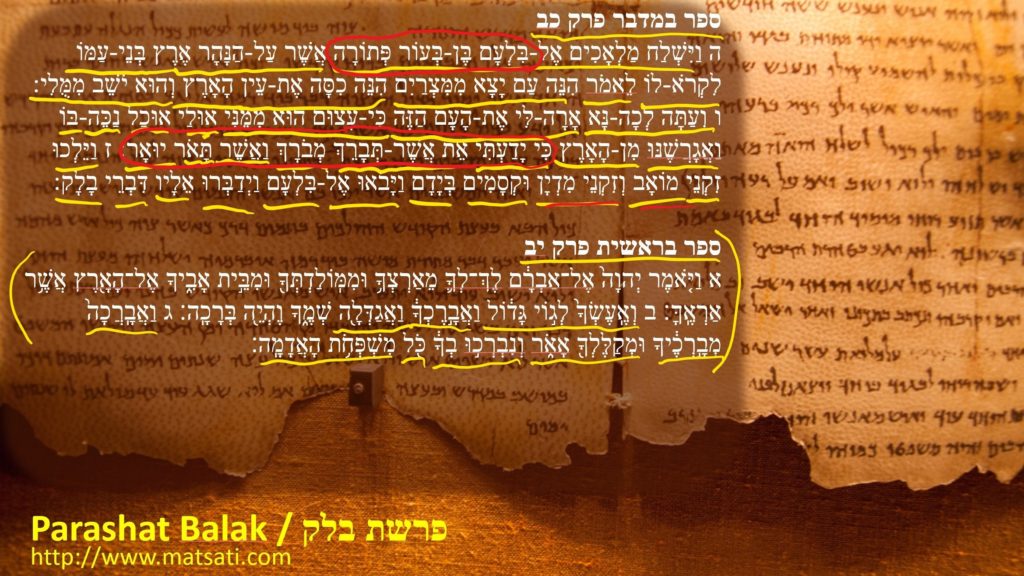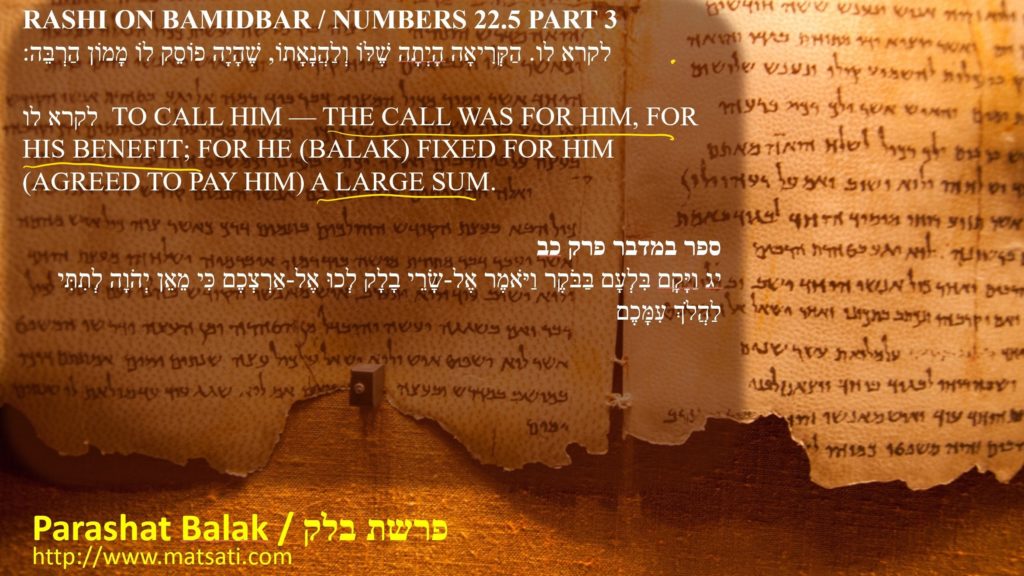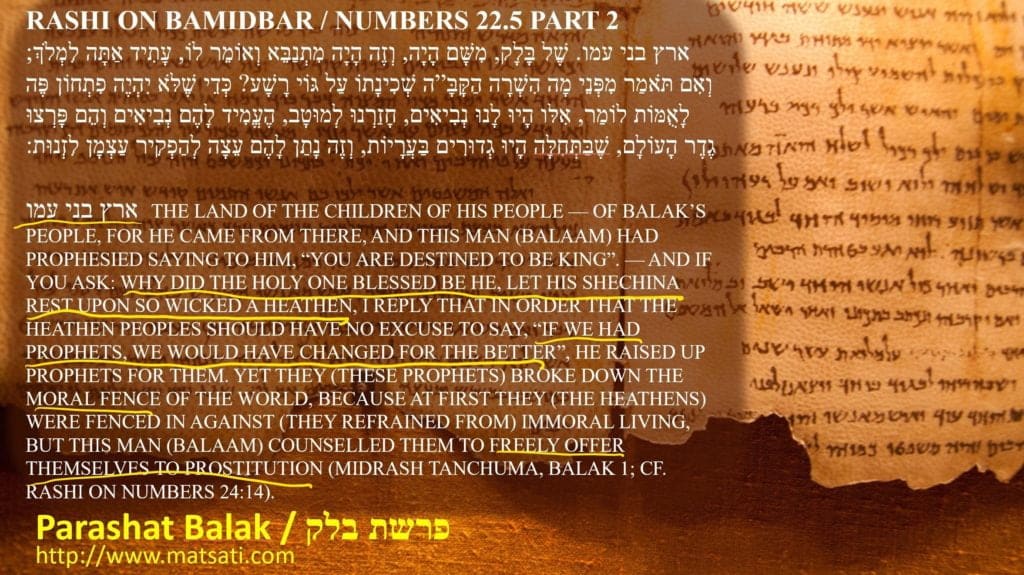In this week’s Torah portion we read about how Balak contacted Bilam and Bilam’s contact with God (22:2-21), when Bilam encounters the Angel (22:22-41), the prophecies of Bilam (23:1-30), the prophecy from Peor (24:1-25), and the sin of Peor (25:1-9). In the opening verses of Parashat Balak we read the following, Bamidbar / Numbers 22:5-7, ה וַיִּשְׁלַח מַלְאָכִים אֶל-בִּלְעָם בֶּן-בְּעוֹר פְּתוֹרָה אֲשֶׁר עַל-הַנָּהָר אֶרֶץ בְּנֵי-עַמּוֹ לִקְרֹא-לוֹ לֵאמֹר הִנֵּה עַם יָצָא מִמִּצְרַיִם הִנֵּה כִסָּה אֶת-עֵין הָאָרֶץ וְהוּא יֹשֵׁב מִמֻּלִי: ו וְעַתָּה לְכָה-נָּא אָרָה-לִּי אֶת-הָעָם הַזֶּה כִּי-עָצוּם הוּא מִמֶּנִּי אוּלַי אוּכַל נַכֶּה-בּוֹ וַאֲגָרֲשֶׁנּוּ מִן-הָאָרֶץ כִּי יָדַעְתִּי אֵת אֲשֶׁר-תְּבָרֵךְ מְבֹרָךְ וַאֲשֶׁר תָּאֹר יוּאָר: ז וַיֵּלְכוּ זִקְנֵי מוֹאָב וְזִקְנֵי מִדְיָן וּקְסָמִים בְּיָדָם וַיָּבֹאוּ אֶל-בִּלְעָם וַיְדַבְּרוּ אֵלָיו דִּבְרֵי בָלָק: 22:5 So he sent messengers to Balaam the son of Beor, at Pethor, which is near the River, in the land of the sons of his people, to call him, saying, ‘Behold, a people came out of Egypt; behold, they cover the surface of the land, and they are living opposite me. 22:6 ‘Now, therefore, please come, curse this people for me since they are too mighty for me; perhaps I may be able to defeat them and drive them out of the land. For I know that he whom you bless is blessed, and he whom you curse is cursed.’ 22:7 So the elders of Moab and the elders of Midian departed with the fees for divination in their hand; and they came to Balaam and repeated Balak’s words to him. (NASB) we are able to see Balak’s faith in Bilam when he says כִּי יָדַעְתִּי אֵת אֲשֶׁר-תְּבָרֵךְ מְבֹרָךְ וַאֲשֶׁר תָּאֹר יוּאָר “For I know that he whom you bless is blessed, and he whom you curse is cursed.” Immediately while reading these passages we should be reminded of similar verbiage in Parashat Lech Lecha, Bereshit / Genesis 12:1-3, א וַיֹּ֤אמֶר יְהוָה֙ אֶל־אַבְרָ֔ם לֶךְ־לְךָ֛ מֵאַרְצְךָ֥ וּמִמּֽוֹלַדְתְּךָ֖ וּמִבֵּ֣ית אָבִ֑יךָ אֶל־הָאָ֖רֶץ אֲשֶׁ֥ר אַרְאֶֽךָּ׃ ב וְאֶֽעֶשְׂךָ֙ לְג֣וֹי גָּד֔וֹל וַאֲבָ֣רֶכְךָ֔ וַאֲגַדְּלָ֖ה שְׁמֶ֑ךָ וֶהְיֵ֖ה בְּרָכָֽה׃ ג וַאֲבָֽרֲכָה֙ מְבָ֣רְכֶ֔יךָ וּמְקַלֶּלְךָ֖ אָאֹ֑ר וְנִבְרְכ֣וּ בְךָ֔ כֹּ֖ל מִשְׁפְּחֹ֥ת הָאֲדָמָֽה׃ “12:1 Now the Lord said to Abram, ‘Go forth from your country, And from your relatives And from your father’s house, To the land which I will show you; 12:2 And I will make you a great nation, And I will bless you, And make your name great; And so you shall be a blessing; 12:3 And I will bless those who bless you, And the one who curses you I will curse. And in you all the families of the earth will be blessed.’” (NASB) We note how God said to Abram לֶךְ־לְךָ֛ מֵאַרְצְךָ֥ וּמִמּֽוֹלַדְתְּךָ֖ וּמִבֵּ֣ית אָבִ֔יךָ “go out from your land, from the land of your birth, from the land of your father,” here the Lord God is calling Abram from a land of Idolatry and divination to a land where he can walk in God’s ways of holiness and righteousness. This is contrasted to what we are reading in the Torah portion פְּתוֹרָה אֲשֶׁר עַל-הַנָּהָר אֶרֶץ בְּנֵי-עַמּוֹ “Pethor, which is near the River, in the land of the sons of his people” a land filled with Idolatry and divination. We note what the outcome would be if Bilam and Balak actually succeeded in cursing the seed of Abraham (all of Israel). God says וַאֲבָֽרֲכָה֙ מְבָ֣רְכֶ֔יךָ וּמְקַלֶּלְךָ֖ אָאֹ֑ר “And I will bless those who bless you, And the one who curses you I will curse.” Their cursing Israel would lead to the curse turning back upon them! Now Bilam and Balak do not necessarily have knowledge of what God had said, there is some level of ignorance involved here, but that of course is no excuse. So the text states, ז וַיֵּלְכוּ זִקְנֵי מוֹאָב וְזִקְנֵי מִדְיָן וּקְסָמִים בְּיָדָם וַיָּבֹאוּ אֶל-בִּלְעָם וַיְדַבְּרוּ אֵלָיו דִּבְרֵי בָלָק “the elders of Moab and the elders of Midian departed with the fees for divination in their hand; and they came to Balaam and repeated Balak’s words to him.” The elders took their money, and went to Bilam to bribe him into cursing Israel. Rashi connects on these verses saying the following:


Rashi on Bamidbar / Numbers 22.5 Part 3
לקרא לו. הַקְּרִיאָה הָיְתָה שֶׁלּוֹ וְלַהֲנָאָתוֹ, שֶׁהָיָה פוֹסֵק לוֹ מָמוֹן הַרְבֵּה:
לקרא לו TO CALL HIM — the call was for him, for his benefit; for he (Balak) fixed for him (agreed to pay him) a large sum.
Paul wrote that the love of money is the root of all sorts of evil. (1 Timothy 6:10) Paul rationalizes this saying by craving money, some have wandered away from the faith and pierced themselves with many sorrows. Rashi draws out the point of Balak fixing an amount of money that would cause Bilam to come running to his help saying this money was a large sum. The amount of money that Balak was offering Bilam was immense. Based upon the narrative, this money caused Bilam to struggle with God. He wanted the money, but he also wanted to do what the Lord says. Money has a way of warping the truth and what God truly wants for our lives. This is why Paul gave such a warning like he did to Timothy. These things are as relevant for us today as it was back in this day to teach us we are to live and give our lives over to the Lord by believing in Him and walking in His ways in His calling on our lives! This is apposed to the idea of being called to simply acknowledge who God is, who Yeshua (Jesus) is, and then go and live our lives in the way that seems right in our own eyes. We are not called to live at the whim or pleasure and wealth. The point is it takes a lot of effort to humble ourselves and turn from our ways to seek the Lord and His ways for our lives. This is why it is absolutely necessary for us to receive God’s help in doing this as left to ourselves we will choose to do what pleases us, just like what we see is going on in Bilam’s life according to the Torah!
The scriptures we are looking at for this week are from Bamidbar / Numbers 22:5-21.
ספר במדבר פרק כב
ה וַיִּשְׁלַח מַלְאָכִים אֶל-בִּלְעָם בֶּן-בְּעוֹר פְּתוֹרָה אֲשֶׁר עַל-הַנָּהָר אֶרֶץ בְּנֵי-עַמּוֹ לִקְרֹא-לוֹ לֵאמֹר הִנֵּה עַם יָצָא מִמִּצְרַיִם הִנֵּה כִסָּה אֶת-עֵין הָאָרֶץ וְהוּא יֹשֵׁב מִמֻּלִי: ו וְעַתָּה לְכָה-נָּא אָרָה-לִּי אֶת-הָעָם הַזֶּה כִּי-עָצוּם הוּא מִמֶּנִּי אוּלַי אוּכַל נַכֶּה-בּוֹ וַאֲגָרֲשֶׁנּוּ מִן-הָאָרֶץ כִּי יָדַעְתִּי אֵת אֲשֶׁר-תְּבָרֵךְ מְבֹרָךְ וַאֲשֶׁר תָּאֹר יוּאָר: ז וַיֵּלְכוּ זִקְנֵי מוֹאָב וְזִקְנֵי מִדְיָן וּקְסָמִים בְּיָדָם וַיָּבֹאוּ אֶל-בִּלְעָם וַיְדַבְּרוּ אֵלָיו דִּבְרֵי בָלָק: ח וַיֹּאמֶר אֲלֵיהֶם לִינוּ פֹה הַלַּיְלָה וַהֲשִׁבֹתִי אֶתְכֶם דָּבָר כַּאֲשֶׁר יְדַבֵּר יְהוָֹה אֵלָי וַיֵּשְׁבוּ שָֹרֵי-מוֹאָב עִם-בִּלְעָם: ט וַיָּבֹא אֱלֹהִים אֶל-בִּלְעָם וַיֹּאמֶר מִי הָאֲנָשִׁים הָאֵלֶּה עִמָּךְ: י וַיֹּאמֶר בִּלְעָם אֶל-הָאֱלֹהִים בָּלָק בֶּן-צִפֹּר מֶלֶךְ מוֹאָב שָׁלַח אֵלָי: יא הִנֵּה הָעָם הַיֹּצֵא מִמִּצְרַיִם וַיְכַס אֶת-עֵין הָאָרֶץ עַתָּה לְכָה קָבָה-לִּי אֹתוֹ אוּלַי אוּכַל לְהִלָּחֶם בּוֹ וְגֵרַשְׁתִּיו: יב וַיֹּאמֶר אֱלֹהִים אֶל-בִּלְעָם לֹא תֵלֵךְ עִמָּהֶם לֹא תָאֹר אֶת-הָעָם כִּי בָרוּךְ הוּא: [שני] [חמישי כשהן מחוברין] יג וַיָּקָם בִּלְעָם בַּבֹּקֶר וַיֹּאמֶר אֶל-שָֹרֵי בָלָק לְכוּ אֶל-אַרְצְכֶם כִּי מֵאֵן יְהֹוָה לְתִתִּי לַהֲלֹךְ עִמָּכֶם: יד וַיָּקוּמוּ שָֹרֵי מוֹאָב וַיָּבֹאוּ אֶל-בָּלָק וַיֹּאמְרוּ מֵאֵן בִּלְעָם הֲלֹךְ עִמָּנוּ: טו וַיֹּסֶף עוֹד בָּלָק שְׁלֹחַ שָֹרִים רַבִּים וְנִכְבָּדִים מֵאֵלֶּה: טז וַיָּבֹאוּ אֶל-בִּלְעָם וַיֹּאמְרוּ לוֹ כֹּה אָמַר בָּלָק בֶּן-צִפּוֹר אַל-נָא תִמָּנַע מֵהֲלֹךְ אֵלָי: יז כִּי-כַבֵּד אֲכַבֶּדְךָ מְאֹד וְכֹל אֲשֶׁר-תֹּאמַר אֵלַי אֶעֱשֶֹה וּלְכָה-נָּא קָבָה לִּי אֵת הָעָם הַזֶּה: יח וַיַּעַן בִּלְעָם וַיֹּאמֶר אֶל-עַבְדֵי בָלָק אִם-יִתֶּן-לִי בָלָק מְלֹא בֵיתוֹ כֶּסֶף וְזָהָב לֹא אוּכַל לַעֲבֹר אֶת-פִּי יְהוָֹה אֱלֹהָי לַעֲשֹוֹת קְטַנָּה אוֹ גְדוֹלָה: יט וְעַתָּה שְׁבוּ נָא בָזֶה גַּם-אַתֶּם הַלָּיְלָה וְאֵדְעָה מַה-יֹּסֵף יְהוָֹה דַּבֵּר עִמִּי: כ וַיָּבֹא אֱלֹהִים | אֶל-בִּלְעָם לַיְלָה וַיֹּאמֶר לוֹ אִם-לִקְרֹא לְךָ בָּאוּ הָאֲנָשִׁים קוּם לֵךְ אִתָּם וְאַךְ אֶת-הַדָּבָר אֲשֶׁר-אֲדַבֵּר אֵלֶיךָ אֹתוֹ תַעֲשֶֹה: [שלישי] כא וַיָּקָם בִּלְעָם בַּבֹּקֶר וַיַּחֲבֹשׁ אֶת-אֲתֹנוֹ וַיֵּלֶךְ עִם-שָֹרֵי מוֹאָב:
Bamidbar / Numbers 22:5-21
22:5 So he sent messengers to Balaam the son of Beor, at Pethor, which is near the River, in the land of the sons of his people, to call him, saying, ‘Behold, a people came out of Egypt; behold, they cover the surface of the land, and they are living opposite me. 22:6 ‘Now, therefore, please come, curse this people for me since they are too mighty for me; perhaps I may be able to defeat them and drive them out of the land. For I know that he whom you bless is blessed, and he whom you curse is cursed.’ 22:7 So the elders of Moab and the elders of Midian departed with the fees for divination in their hand; and they came to Balaam and repeated Balak’s words to him. 22:8 He said to them, ‘Spend the night here, and I will bring word back to you as the Lord may speak to me.’ And the leaders of Moab stayed with Balaam. 22:9 Then God came to Balaam and said, ‘Who are these men with you?’ 22:10 Balaam said to God, ‘Balak the son of Zippor, king of Moab, has sent word to me, 22:11 ‘Behold, there is a people who came out of Egypt and they cover the surface of the land; now come, curse them for me; perhaps I may be able to fight against them and drive them out.’‘ 22:12 God said to Balaam, ‘Do not go with them; you shall not curse the people, for they are blessed.’ 22:13 So Balaam arose in the morning and said to Balak’s leaders, ‘Go back to your land, for the Lord has refused to let me go with you.’ 22:14 The leaders of Moab arose and went to Balak and said, ‘Balaam refused to come with us.’ 22:15 Then Balak again sent leaders, more numerous and more distinguished than the former. 22:16 They came to Balaam and said to him, ‘Thus says Balak the son of Zippor, ‘Let nothing, I beg you, hinder you from coming to me; 22:17 for I will indeed honor you richly, and I will do whatever you say to me. Please come then, curse this people for me.’‘ 22:18 Balaam replied to the servants of Balak, ‘Though Balak were to give me his house full of silver and gold, I could not do anything, either small or great, contrary to the command of the Lord my God. 22:19 ‘Now please, you also stay here tonight, and I will find out what else the Lord will speak to me.’ 22:20 God came to Balaam at night and said to him, ‘If the men have come to call you, rise up and go with them; but only the word which I speak to you shall you do.’ 22:21 So Balaam arose in the morning, and saddled his donkey and went with the leaders of Moab. (NASB)
Bilam spoke with God at night, and in the morning spoke with the men Balak sent saying יג וַיָּקָם בִּלְעָם בַּבֹּקֶר וַיֹּאמֶר אֶל-שָֹרֵי בָלָק לְכוּ אֶל-אַרְצְכֶם כִּי מֵאֵן יְהֹוָה לְתִתִּי לַהֲלֹךְ עִמָּכֶם 22:13 So Balaam arose in the morning and said to Balak’s leaders, ‘Go back to your land, for the Lord has refused to let me go with you.’ (NASB) It is at this point it seems Bilam started having trouble trusting the word of the Lord because of the amount of money he is being offered. Bilam asks the men to stay another night as he would seek the Lord again to see if the message would change. It is interesting how often this sort of thing goes on today in the lives of the Minim (the believers). We have been given God’s Word, we have this blessing today with the printing press, and bibles available in many languages, both hard copy and digital. We can without a doubt know what God expects of us, but yet many have doubts just like Bilam. In addition to these things, there are additional phenomenon that accompanies doubting God as this is synonymous to not trusting in the Lord which leads to struggles with fear, anxiety, and worry. When this happens, these things lead to dread and hopelessness in almost any situation and at all times, something also known as “depression.” Note that doubting and questioning our faith or what God wants for our lives are often part of our journey of faith. However, if these kinds of things remain persistent in our lives they can lead to chronic behaviors such as depression. Considering the Torah portion, this was not the case for Bilam as he was not a part of the family of God right? He was a prophet from a foreign nation, a nation of idolatry and divinations. Because of this it is surprising how he had the ear of God. Notice what the rabbis say concerning this.

Rashi on Bamidbar / Numbers 22.5 part 2
ארץ בני עמו. שֶׁל בָּלָק, מִשָּׁם הָיָה, וְזֶה הָיָה מִתְנַבֵּא וְאוֹמֵר לוֹ, עָתִיד אַתָּה לִמְלֹךְ; וְאִם תֹּאמַר מִפְּנֵי מָה הִשְׁרָה הַקָּבָּ”ה שְׁכִינָתוֹ עַל גּוֹי רָשָׁע? כְּדֵי שֶׁלֹּא יִהְיֶה פִתְחוֹן פֶּה לָאֻמּוֹת לוֹמַר, אִלּו הָיוּ לָנוּ נְבִיאִים, חָזַרְנוּ לְמוּטָב, הֶעֱמִיד לָהֶם נְבִיאִים וְהֵם פָּרְצוּ גֶדֶר הָעוֹלָם, שֶׁבַּתְּחִלָּה הָיוּ גְדוּרִים בַּעֲרָיוֹת, וְזֶה נָתַן לָהֶם עֵצָה לְהַפְקִיר עַצְמָן לִזְנוּת:
ארץ בני עמו THE LAND OF THE CHILDREN OF HIS PEOPLE — of Balak’s people, for he came from there, and this man (Balaam) had prophesied saying to him, “You are destined to be king”. — And if you ask: Why did the Holy One blessed be He, let his Shechina rest upon so wicked a heathen, I reply that in order that the heathen peoples should have no excuse to say, “If we had prophets, we would have changed for the better”, He raised up prophets for them. Yet they (these prophets) broke down the moral fence of the world, because at first they (the heathens) were fenced in against (they refrained from) immoral living, but this man (Balaam) counselled them to freely offer themselves to prostitution (Midrash Tanchuma, Balak 1; cf. Rashi on Numbers 24:14).
The rabbinic reasoning starts with asking the question why God would allow His Shechina (שְׁכִינָתוֹ) to rest upon a wicked heathen. The conclusion was so the nations have no excuse. The idea isn’t a matter of Bilam having a lack of faith. Obviously, based upon what we know according to the Torah, Bilam tells Balak how to cause Israel to be cursed. The way to take upon oneself the curses of God according to the Torah is to walk in the way of the nations, to fall into Idolatry, sexual sin, and unfaithfulness and this was the recommendation of Bilam to Balak. This is also what lead to Israel’s sin according to Parashat Pinchas (the next Torah portion). The rabbinic conclusion correctly classifies the prophets of the nations as instrumental in the breaking down the moral fence of the world. Bilam wanted to be fully certain about what God had said, and at the same time he was sincerely self-deceived to seek God again because of money, and then to saddle his donkey and go with them!
The struggling with God also remind us of the story of Jacob who fled from his family history, and of how years alter he decided to return home to the Promised Land. There are several things that differ between these two narratives, Jacob trusted in God, while Bilam seemed to do as he pleased. Jacob wrestled with God as we are told according to Bereshit / Genesis 32. Having wrestled with the Angel of the Lord, Jacob’s life changes. We are told he walked differently, due to his hip being crippled slightly as the angel touches his hip socket. It was then that Jacob recognized saying, “I saw God face to face, and yet my life was spared” (Bereshit / Genesis 32:31, וַיִּקְרָ֧א יַעֲקֹ֛ב שֵׁ֥ם הַמָּק֖וֹם פְּנִיאֵ֑ל כִּֽי־רָאִ֤יתִי אֱלֹהִים֙ פָּנִ֣ים אֶל־פָּנִ֔ים וַתִּנָּצֵ֖ל נַפְשִֽׁי׃). Jacob’s encounter with God also led to his name being changed to Israel (Bereshit / Genesis 32:29, וַיֹּ֗אמֶר לֹ֤א יַעֲקֹב֙ יֵאָמֵ֥ר עוֹד֙ שִׁמְךָ֔ כִּ֖י אִם־יִשְׂרָאֵ֑ל כִּֽי־שָׂרִ֧יתָ עִם־אֱלֹהִ֛ים וְעִם־אֲנָשִׁ֖ים וַתּוּכָֽל׃), and most importantly we read how God “blessed him there” (Bereshit / Genesis 32:30, וַיִּשְׁאַ֣ל יַעֲקֹ֗ב וַיֹּ֙אמֶר֙ הַגִּֽידָה־נָּ֣א שְׁמֶ֔ךָ וַיֹּ֕אמֶר לָ֥מָּה זֶּ֖ה תִּשְׁאַ֣ל לִשְׁמִ֑י וַיְבָ֥רֶךְ אֹת֖וֹ שָֽׁם׃). Notice how Jacob’s encounter with God changed his life in many ways! Note now how Bilam’s encounter with God did not lead to a blessing in his life but a stern correcting to not walk in his own ways, but to say and do only what the Lord tells him to do! Bilam remained a wicked man as instructing Balak on how to cause Israel to sin! This is in contrast to Jacob who prevailed in his faith to overcome the pain of his past. There are a few things that we can learn from this week’s Torah portion and paralleling this to Jacob. When Jacob encountered God, his faith overcame the pain of exile, the prison sentence of offending his brother, and fear. And just like what we receive from the story of Bilam and Balak, the struggle is more spiritual as opposed to physical (i.e. note Bilam’s disobedience led to he angel standing in the way to strike him down). We note how Jacob prevailed by faith, and God’s will prevailed in the life of Bilam as speaking a blessing over Israel and not a curse. It is because of these struggles that we go through, the Lord God Almighty sent His Son Yeshua, to die for our sins, to show us God’s mercy through forgiveness, and ultimately as Isaiah states, “gives power to the faint, and to them that have no might, he increases strength” (Isaiah 40:29) so that we can live our lives for the glory of God! This is the meaning of surrendering our lives to the Lord so that He can live and work in and through us by the power of His Spirit. Notice how in both the lives of Jacob and Bilam, this was the turning point in their lives as encountering God. This same thing will happen to us when we believe in Yeshua and what he did, and ask our Father in heaven to send His Spirit to come dwell in our hearts! Struggling and resisting God will lead to years and years of pain and hurt. On the other hand, humbling ourselves, repentance, and freely surrendering His will leads to life and life more abundantly!









